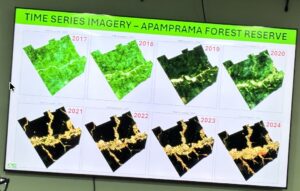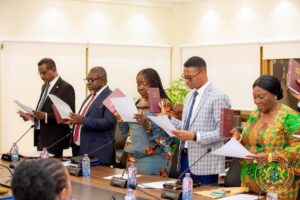
Dr. Richmond Yaw Yeboah, a Sustainable Development Analyst
Dr. Richmond Yaw Yeboah, a Sustainable Development Analyst at the Cape Coast Technical University says government should consider using community watchdog schemes in mining communities to help safeguard forests and water bodies and strengthen independent oversight of the communities against illegal mining.
Richmond made the recommendation in his PhD thesis.
To him, Police/Military interventions since 1989 have all failed to achieve the desired outcome. He thinks that although, the impact of environmental degradation is global, the local people are the most affected hence the need for communities to lead the charge.
In Richmond’s estimation, communities should be empowered to takeover and lead the fight against illegal mining. He recommended institutionalization and empowering of Community Watch Schemes to prevent illegal entry into the forests and rivers. He added that Community Watch Schemes aim to build an informed and vigilant community and encourages members of the community to be actively involved in protecting the environment and livelihoods.
He said, Community Watchdogs requires minimal commitment and allows flexible involvement and runs on low budget. It allows members to share latest updates of crime with their family and friends to raise awareness.
For Richmond, Community Watch Scheme is Ghana’s surest way of dealing with illegal mining.
In his reasoning, we are losing the battle against illegal mining because we have side-stepped the chiefs and communities in our fight.
‘We started fighting against illegal mining since 1989 during the Jerry John Rawlings’ led PNDC government. As recent as 2013, former President John Mahama instituted the Inter-Ministerial Taskforce to deal with illegal mining. Then, President Akufo-Addo in 2018 inaugurated the Operation Vanguard, an anti- galamsey taskforce composed of military and police personnel. Aside the anti-galamsey task-force, there was also Galamstop and Operation Halt II, all working in different capacities to nib the menace in the bud.
Losing the fight, Ghana Armed Forces Council announced that the Military was withdrawing the military from combating illegal mining in February 2020, after more than two years of complaints and warnings.
In the Council’s view, the Military should not be deployed perpetually to undertake Civil Police duties especially in curbing illegal mining.
‘The Council has after careful review taken the decision to withdraw all Military Personnel from mining sites including Operation Vanguard over the next three (3) months. The Council’s view is that the Military should not be deployed perpetually to undertake Civil Police duties especially in curbing illegal mining’. A restricted document sighted by this paper read.
Overwhelmed by activities of illegal miners, government has decided to give some three hundred persons, a one-month training to protect the country’s river bodies from activities of illegal miners.
Addressing the trainees, Commodore Emmanuel Ayesu Kwafo, the Flag Officer Commanding the Eastern Naval Command detailed the scope of the training.
He explained that by the end of the month-long training, the river guards will be equipped with skills in speedboat operation, swimming, among others.
But a dissatisfied environmentalist, Dr. Richmond Yeboah thinks the best way to combat illegal mining effectively is to involve the communities. He also suggest that government should properly plan programmes aimed at fighting illegal mining. He explained that programmes have always been knee jerk reactions and lacked collaboration. He therefore, called for a close collaboration between key stakeholders such as the Ministry of Lands and Natural Resources, the Minerals Commission, Forestry Commission, Water Resources Commission, the Environmental Protection Agency, Chiefs, National Security apparatus among others.






